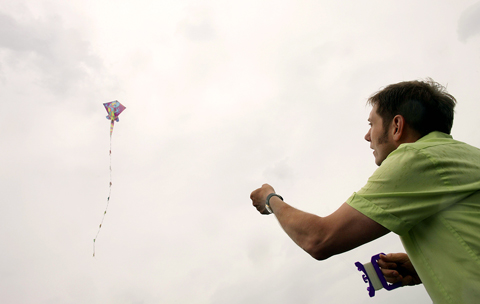The G8 nations dropped a commitment on Saturday to complete the troubled Doha trade round this year and promised to pursue bilateral and regional trade talks until a global deal could be done.
WTO members launched the Doha Round in 2001 but talks have stalled amid arguments over how much rich countries should cut farm subsidies and tariffs in exchange for developing nations opening up their markets.
A communique issued at the end of the G8 summit said merely that members renewed their pledge to finish the round.

PHOTO: AFP
Last year, a G8 summit in Italy and a Pittsburgh meeting of the G20 both committed to an end date for this year.
“G8 members of the WTO renew their commitment to the successful conclusion of the Doha Development Agenda, building on the progress already made,” a joint statement of the eight said.
The text dropped a previous deadline to complete the round by the end of this year. In Toronto, leaders instead appeared to open the door to more regional and bilateral deals, which backers of the Doha Round say make it more difficult to secure a global deal.
Canadian Prime Minister Stephen Harper, who chaired the G8 summit, used words like “at some point” and “eventually” to describe when the deal could be done.
“I would never go so far as to say Doha is dead. I don’t think it’s true and I don’t think we can afford to say that. We’ve got to find a path over time to get to a successful conclusion,” Harper told a closing news conference.
“Those of us who favor liberalized trade are not going to stand still ... Canada and many other governments are committed to more aggressively pursuing bilateral and regional trade deals as a way of kick-starting the process while we see the Doha talks remaining stalled,” he said.
Trade ministers have long said a multilateral trade deal at the WTO is more beneficial for the global economy than more limited bilateral and regional agreements.
Canada, which is holding talks with the EU about a possible free-trade agreement, has in recent years signed such deals with Israel and Chile. Along with the US and Mexico, it is part of the North American Free Trade Agreement, which came into force in 1994.
The US last week blamed China and other big emerging economies for the deadlock.
Harper said the G8 agreed that “to have a successful round in the Doha Round, eventually we all must raise our level of ambition.”

GEARING UP: An invasion would be difficult and would strain China’s forces, but it has conducted large-scale training supporting an invasion scenario, the report said China increased its military pressure on Taiwan last year and took other steps in preparation for a potential invasion, an annual report published by the US Department of Defense on Wednesday showed. “Throughout 2023, Beijing continued to erode longstanding norms in and around Taiwan by employing a range of pressure tactics against Taiwan,” the report said, which is titled “Military and Security Developments Involving the People’s Republic of China (PRC) 2024.” The Chinese People’s Liberation Army (PLA) “is preparing for a contingency to unify Taiwan with the PRC by force, if perceived as necessary by Beijing, while simultaneously deterring, delaying or denying

‘LAGGING BEHIND’: The NATO secretary-general called on democratic allies to be ‘clear-eyed’ about Beijing’s military buildup, urging them to boost military spending NATO Secretary-General Mark Rutte mentioning China’s bullying of Taiwan and its ambition to reshape the global order has significance during a time when authoritarian states are continuously increasing their aggression, the Ministry of Foreign Affairs (MOFA) said yesterday. In a speech at the Carnegie Europe think tank in Brussels on Thursday, Rutte said Beijing is bullying Taiwan and would start to “nibble” at Taiwan if Russia benefits from a post-invasion peace deal with Ukraine. He called on democratic allies to boost defense investments and also urged NATO members to increase defense spending in the face of growing military threats from Russia

PEACEFUL RESOLUTION: A statement issued following a meeting between Australia and Britain reiterated support for Taiwan and opposition to change in the Taiwan Strait Canada should support the peaceful resolution of Taiwan’s destiny according to the will of Taiwanese, Canadian lawmakers said in a resolution marking the second anniversary of that nation’s Indo-Pacific strategy on Monday. The Canadian House of Commons committee on Canada-Chinese relations made the comment as part of 34 recommendations for the new edition of the strategy, adding that Ottawa should back Taiwan’s meaningful participation in international organizations. Canada’s Indo-Pacific Strategy, first published in October 2022, emphasized that the region’s security, trade, human rights, democracy and environmental protection would play a crucial role in shaping Canada’s future. The strategy called for Canada to deepen

TECH CONFERENCE: Input from industry and academic experts can contribute to future policymaking across government agencies, President William Lai said Multifunctional service robots could be the next new area in which Taiwan could play a significant role, given its strengths in chip manufacturing and software design, Taiwan Semiconductor Manufacturing Co (TSMC, 台積電) chairman and chief executive C.C. Wei (魏哲家) said yesterday. “In the past two months, our customers shared a lot of their future plans with me. Artificial intelligence [AI] and AI applications were the most talked about subjects in our conversation,” Wei said in a speech at the National Science and Technology Conference in Taipei. TSMC, the world’s biggest contract chipmaker, counts Nvidia Corp, Advanced Micro Devices Inc, Apple Inc and